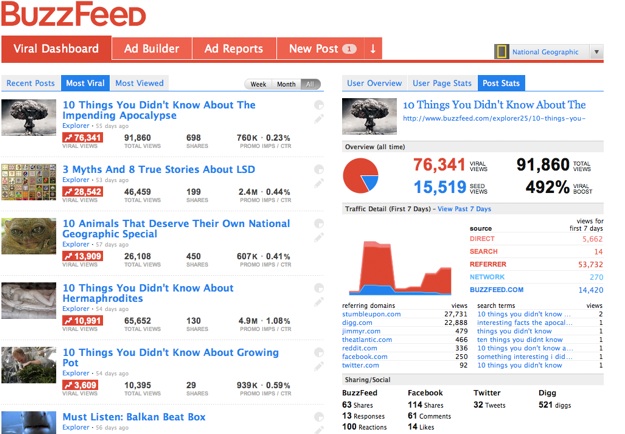
Making buzz happen online is an elusive enterprise, but BuzzFeed is making a business around it. The New York City startup just raised an $8 million series B financing, led by RRE Ventures. Ron Conway (via SV Angel) and Chris Dixon (via Founder Collective) also invested. BuzzFeed previously raised a $3.5 million series A in 2008 from Hearst, Softbank, and Ken Lerer (who all put in more money this round as well).
BuzzFeed founder Jonah Peretti was one of the original founding partners of the Huffington Post. Ken Lerer is the chairman of both companies, and also an investor in BuzzFeed. Peretti moved on to BuzzFeed, which tracks and promotes viral video, articles, and other content across the Web. Peretti is also the guy behind the Rejection Line and other online pranks. BuzzFeed’s business is helping publishers like Time, the Huffington Post, brands like Viacom or ad agencies spread the buzz.
Here is how Pereti explains his business: “We built a viral analytics platform that tracks how consumers interact with media in realtime and a viral advertising platform that sends more traffic to the content that is actually working. So we optimize content for viral distribution using realtime data and we make money through viral advertising on our site and network.”
Peretti plans to use the new money scale up BuzzFeed and launch a new self-serve product that will allow publishers and brands to try to manage their own viral buzz campaign. Up until now, BuzzFeed has managed each campaign on a custom basis and experimented to see what kind of strategies work. It offers free Buzz analytics which lets Website track the viral spread of their own content. On the viral promotions side, BuzzFeed tries to detect early when consumers start to pick up and share content and then promote that through different channels, including BuzzFeed.com itself (which has about 3 million monthly unique visitors in the U.S.) and the larger BuzzFeed network through widgets on Websites and other means. The ultimate win, says Peretti, is when an “advertiser gets on front page of Digg, Twitter and gets all of this organic traffic for free.”
Along with the self-serve product, BuzzFeed will also settle on a consistent pricing model. The company is also hiring, going from 12 employees a month ago to 25 in the next few months. Not bad for something that started as a side project. Check out this video for some more background on Peretti.
